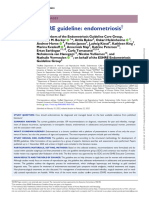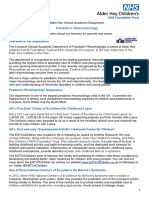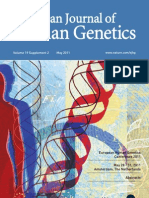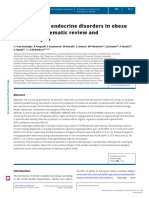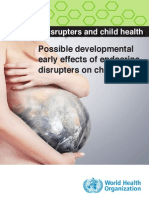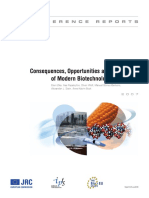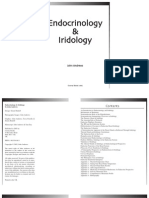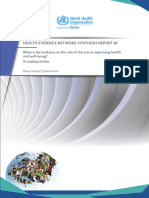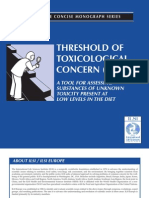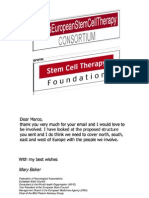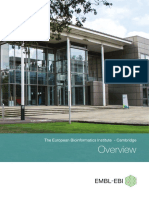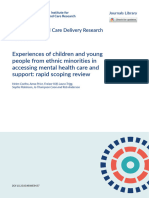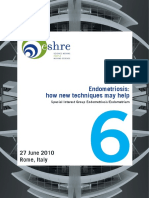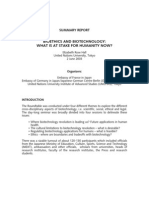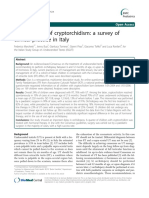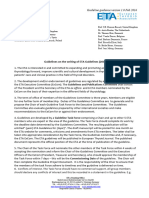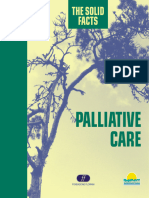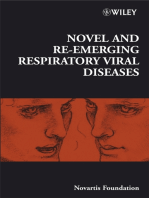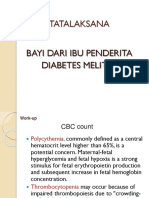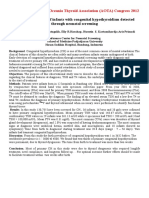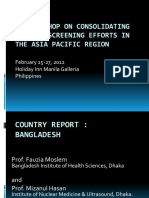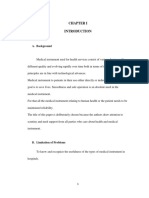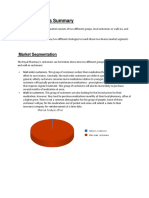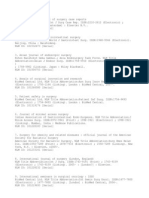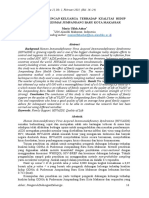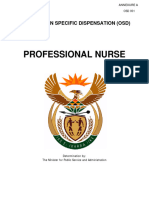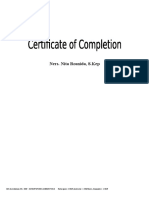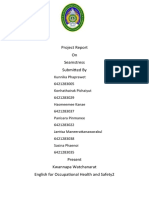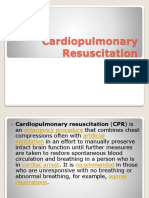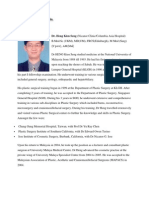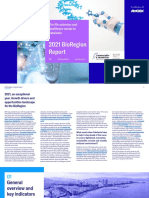Improving Care of Children With Endocrine Diseases by Promoting Knowledge and Research
Improving Care of Children With Endocrine Diseases by Promoting Knowledge and Research
Uploaded by
puspaCopyright:
Available Formats
Improving Care of Children With Endocrine Diseases by Promoting Knowledge and Research
Improving Care of Children With Endocrine Diseases by Promoting Knowledge and Research
Uploaded by
puspaOriginal Description:
Original Title
Copyright
Available Formats
Share this document
Did you find this document useful?
Is this content inappropriate?
Copyright:
Available Formats
Improving Care of Children With Endocrine Diseases by Promoting Knowledge and Research
Improving Care of Children With Endocrine Diseases by Promoting Knowledge and Research
Uploaded by
puspaCopyright:
Available Formats
Secretary General: Prof.
Franco Chiarelli
“Improving care of children with endocrine diseases by promoting knowledge and research”
Department of Paediatric & Adolescent Endocrinology
University College London Hospital
250 Euston Road
London NW1 2PQ
Tel: +44 203 447 5240
24th August 2011
Dear Friends,
ESPE International Consensus Meeting on Congenital Hypothyroidism
ESPE has realised the need to seek evidence based guidance in the management of
congenital hypothyroidism, so we have organised a Consensus Meeting. One of the
intentions of this consensus meeting is to provide a global directive in the management
of this important condition. Inevitably organisation of such a meeting is dependent upon
funding which was difficult due to the lack of commercial funding that other consensus
meetings attract. Thanks to major support from the ESPE Council and the Istituto
Superiore di Sanita (Italian Ministry of Health) and a scientific grant from Merck
Serono, we are now in a position to proceed.
A meeting is planned to take place over 2 days, 28-29th November 2011 at the
headquarters of the Istituto in Rome. The suggested topics for evaluation of existing
literature and knowledge are attached and the objective of this meeting will be to
provide evaluation of current evidence and synthesise guidance – both for high and low
income countries.
We would be honoured if Asia Pacific Paediatric Endocrine Society would be willing to
participate. We would suggest 1-2 members with recognised expertise and interest who
have a track record of clinical activity and publishing within a topic category who would
be able to contribute to one or two of the agreed working groups (see attached
document). We anticipate the total number of active participants will be limited to 30 -
35 based on experience of ESPE consensus meetings as any bigger then active
discussion is limited. The consensus meeting funds would be able to cover all the costs
of the delegates within Rome, but we would ask that your Society cover travel costs to
the meeting only. Inevitably, there are responsibilities attached to this to make the
venture a success.
We would hope that the consensus meeting would be a final pulling together and
discussion of the topics to be debated with much of the synthesis of evidence having
taken place beforehand. We therefore suggest the following timetable:
ESPE Secretariat - Euro House, 22 Apex Court, Woodlands, Bristol BS32 4JT, United Kingdom
Tel: +44 (0)1454 642246; Fax: +44 (0)1454 642222; Email: espe@eurospe.org; Website: www.eurospe.org
European Society for Paediatric Endocrinology Limited
Company limited by guarantee Registered in England & Wales Company no: 5766541; Charity no: 1122484
Registered office: 65 Carter Lane, London EC4V 5HF, United Kingdom
Secretary General: Prof. Franco Chiarelli
“Improving care of children with endocrine diseases by promoting knowledge and research”
April- Sept 2011 – convene working groups – a draft of the planned working group
activity and provide draft synthesis of evidence
September 27 2011 - initial meeting for those present at ESPE in Glasgow
October 2011 - draft evidence-based document for general discussion
28-29 November 2011 - Consensus meeting in Rome
February 2012 - submit for publication
We do hope you will be able to take part in this important venture. We look forward to
hearing your response shortly.
Yours sincerely,
Professor Gary Butler
Department of Paediatric and Adolescent Endocrinology
University College London and Great Ormond Street Hospitals, London.
ESPE Chairman of the Clinical Practice Committee and Member of Council.
Juliane Léger
Professor Juliane Léger
Endocrinologie Diabétologie Pédiatrique
Centre de Référence Maladies Endocriniennes de la Croissance
Hôpital Robert Debré, Paris.
Dr Antonella Olivieri
Metabolism and Endocrinology Unit
Department of Cell Biology and Neurosciences
Istituto Superiore di Sanità, Roma
ESPE Secretariat - Euro House, 22 Apex Court, Woodlands, Bristol BS32 4JT, United Kingdom
Tel: +44 (0)1454 642246; Fax: +44 (0)1454 642222; Email: espe@eurospe.org; Website: www.eurospe.org
European Society for Paediatric Endocrinology Limited
Company limited by guarantee Registered in England & Wales Company no: 5766541; Charity no: 1122484
Registered office: 65 Carter Lane, London EC4V 5HF, United Kingdom
Secretary General: Prof. Franco Chiarelli
“Improving care of children with endocrine diseases by promoting knowledge and research”
ESPE consensus meeting on Congenital hypothyroidism
List of topics by group
1 – Newborn Screening: Selection of newborns at risk of congenital hypothyroidism
(Toni Torresani)
What is the evidence for screening CH
Analysis of CH screening strategies (TSH or TSH+T4, others) in terms of: analytical
methodology, effictiveness, efficacy and costs
What biochemical criteria should be used for Special categories of newborn at risk of
CH (preterm, very sick babies , born to mothers with thyroid pathologies, early
hospital discharge)
What biochemical criteria/strategies should be used to confirm a positive CH
screening test
2 – Clinical diagnosis: Selection of patients for management and treatment
(Malcolm Donaldson)
What biochemical criteria should be used in the decision to initiate treatment
What criteria should be used to assess severity of CH in term of clinical, biochemical
and radiological features
What is the place of scintigraphy (and perchlorate discharge test) ultrasonography in
the diagnosis of CH
Should there be specific evaluation(s) to look after associated malformation(s)
What special consideration to the treatment and management of CH in patients with
specific associated malformations/etiology: i.e. pesudohypoparathyroidism, Down’s
syndrome, Pendred syndrome…
Criteria for transient vs permanent form of hypothyroidism. What way should be
used in the decision to discontinue therapy in case of normally sited gland.
Communication of CH diagnosis to families and involvement of familial
physicians/pediatricians
3- Drug administration and monitoring during infancy, childhood and adulthood
(Heiko Krude/ Annette Gruters)
What are the currently available therapeutic regimens for L-thyroxine treatment and
how do they compare in terms of efficacy: route of administration (per os, IV), tablets
and solution.
What are the available protocol for L-thyroxine dosage at start of treatment during
the neonatal period
How should patients treated for CH be monitored for substitutive L-thyroxine
treatment
What adverse events may occur in children being treated with L-thyroxine
How should women treated for CH be monitored during pregnancy
ESPE Secretariat - Euro House, 22 Apex Court, Woodlands, Bristol BS32 4JT, United Kingdom
Tel: +44 (0)1454 642246; Fax: +44 (0)1454 642222; Email: espe@eurospe.org; Website: www.eurospe.org
European Society for Paediatric Endocrinology Limited
Company limited by guarantee Registered in England & Wales Company no: 5766541; Charity no: 1122484
Registered office: 65 Carter Lane, London EC4V 5HF, United Kingdom
Secretary General: Prof. Franco Chiarelli
“Improving care of children with endocrine diseases by promoting knowledge and research”
4 – outcomes (Guy van Vliet)
What are the data regarding long-term outcome of children treated with L-thyroxine
in terms of cognitive function
What are the data regarding long-term outcome of children treated with L-thyroxine
in terms of growth and puberty
What are the data regarding long-term outcome of children treated with L-thyroxine
in terms of bone
What are the data regarding long-term outcome of children treated with L-thyroxine
in terms of cardio vascular and metabolic diseases
What are the data regarding long-term outcome of children treated with L-thyroxine
in terms of fertility
What are the data regarding long-term outcome of children treated with L-thyroxine
in terms of quality of life and self esteem
What are the data regarding long-term outcome of children treated with L-thyroxine
in terms of compliance/adherence to treatment
5- Genetic counselling, indication of molecular biology and antenatal management
(Michel Polak)
What criteria should be used for genetic counselling
Should there be specific criteria used to use molecular biology in the diagnosis and
management of CH
What, if any, is a potential indication for antenatal diagnosis
What, if any, criteria should be used in the decision to treat a fetus in utero and how
it should be managed
ESPE Secretariat - Euro House, 22 Apex Court, Woodlands, Bristol BS32 4JT, United Kingdom
Tel: +44 (0)1454 642246; Fax: +44 (0)1454 642222; Email: espe@eurospe.org; Website: www.eurospe.org
European Society for Paediatric Endocrinology Limited
Company limited by guarantee Registered in England & Wales Company no: 5766541; Charity no: 1122484
Registered office: 65 Carter Lane, London EC4V 5HF, United Kingdom
You might also like
- Community Health Nursing Astig NurseDocument4 pagesCommunity Health Nursing Astig NurseKristine Singson100% (1)
- Trotsenburg 2021Document33 pagesTrotsenburg 2021PPDS ANAK FK USUNo ratings yet
- AdvocacyDocument72 pagesAdvocacyÁlvaro DíazNo ratings yet
- Endometriosis GuidelinesDocument26 pagesEndometriosis GuidelinesVincentius EdwinNo ratings yet
- Hoac 009Document26 pagesHoac 009AbrilNo ratings yet
- Az 2752Document338 pagesAz 2752biblioteca economicaNo ratings yet
- The Solid Facts - Palliative Care PDFDocument35 pagesThe Solid Facts - Palliative Care PDFDamarys DecothéNo ratings yet
- Guias de Fototerapia Gran BretañaDocument525 pagesGuias de Fototerapia Gran Bretañakichilla1No ratings yet
- Emrc wpIIDocument76 pagesEmrc wpIIMohammed Abu SufianNo ratings yet
- Guia EURAGDocument32 pagesGuia EURAGLaiza BoellNo ratings yet
- MAH EatingDis11 8pp Web 8.02.11Document8 pagesMAH EatingDis11 8pp Web 8.02.11Tomas LarsonNo ratings yet
- Rheumatology Service Leaflet PIAG 50Document5 pagesRheumatology Service Leaflet PIAG 50OanaMihaescuNo ratings yet
- Ettic in NeontologiDocument26 pagesEttic in NeontologiWiwit ClimberNo ratings yet
- Kce 139c Guideline Low Risk BirthDocument186 pagesKce 139c Guideline Low Risk BirthmarcelavpavaniNo ratings yet
- Definisi DK Eropa-WoncaDocument32 pagesDefinisi DK Eropa-WoncaHanif Alienda WardhaniNo ratings yet
- ESHG2011 AbstractsDocument561 pagesESHG2011 Abstractsptrocha21No ratings yet
- (1479683X - European Journal of Endocrinology) Prevalence of Endocrine Disorders in Obese Patients - Systematic Review and Meta-AnalysisDocument11 pages(1479683X - European Journal of Endocrinology) Prevalence of Endocrine Disorders in Obese Patients - Systematic Review and Meta-AnalysisLeonardo CatalanoNo ratings yet
- Possible Developmental Early Effects of Endocrine Disrupters On Child HealthDocument93 pagesPossible Developmental Early Effects of Endocrine Disrupters On Child HealthheyliaaNo ratings yet
- Male Hypogonadism Endorsing Organization European Society of EndocrinologyDocument18 pagesMale Hypogonadism Endorsing Organization European Society of Endocrinologyimran karimNo ratings yet
- Bio4eu StudyDocument149 pagesBio4eu StudyRodolfoMadNo ratings yet
- Endocrinology and IridologyDocument136 pagesEndocrinology and Iridologygelongnavarro100% (3)
- Survey of Healthcare Workers KAPDocument108 pagesSurvey of Healthcare Workers KAPQuiz PAUNo ratings yet
- Definition 3rd Ed 2011, Wonca Tree PDFDocument33 pagesDefinition 3rd Ed 2011, Wonca Tree PDFAgenk NatanegaraNo ratings yet
- Mental Health Legislation & Human RightsDocument68 pagesMental Health Legislation & Human RightskymalogaNo ratings yet
- PDFDocument36 pagesPDFNaomi Rivera RoblesNo ratings yet
- Informe OMS Arte y Salud 2019Document146 pagesInforme OMS Arte y Salud 2019pablog17No ratings yet
- Changing Role of Hospitals EngDocument328 pagesChanging Role of Hospitals EngSimone FerreiraNo ratings yet
- College Annual Report 2001-2002Document51 pagesCollege Annual Report 2001-2002stevetkwongNo ratings yet
- 1 Advocacy WEB 07 PDFDocument72 pages1 Advocacy WEB 07 PDFlpmendoncaNo ratings yet
- Journal HyponatremiaDocument39 pagesJournal HyponatremiadharmaNo ratings yet
- ILSI Threshold of Toxicological ConcernDocument37 pagesILSI Threshold of Toxicological ConcernRaquel LopesNo ratings yet
- Basic ItalianBookLDDocument60 pagesBasic ItalianBookLDjaverianaNo ratings yet
- TESCTflyer 2012Document11 pagesTESCTflyer 2012Marco TraubNo ratings yet
- The European Bioinformatics Institute - CambridgeDocument24 pagesThe European Bioinformatics Institute - CambridgeAhsan Arshad BSIT-F16-LC-008No ratings yet
- Pentalaksanaan RBDocument84 pagesPentalaksanaan RBFara Sakina RahmaNo ratings yet
- Oms Role of Arts EvidenceDocument146 pagesOms Role of Arts EvidenceMIRIAM CAZADOR100% (1)
- Bookshelf NBK582447Document102 pagesBookshelf NBK582447Forensicscience Batch2020No ratings yet
- Endometriosis Eshre 2010Document140 pagesEndometriosis Eshre 2010jawaralopangNo ratings yet
- Bioethics and Biotechnology: What Is at Stake For Humanity Now?Document10 pagesBioethics and Biotechnology: What Is at Stake For Humanity Now?Krzy SolarNo ratings yet
- Guideline Who Preeclampsia-EclampsiaDocument48 pagesGuideline Who Preeclampsia-EclampsiaRahmania Noor AdibaNo ratings yet
- Teede 2023 Recommendations From The InternatiDocument27 pagesTeede 2023 Recommendations From The InternatixxxxNo ratings yet
- UCC Library and UCC Researchers Have Made This Item Openly Available. Please How This Has Helped You. Thanks!Document9 pagesUCC Library and UCC Researchers Have Made This Item Openly Available. Please How This Has Helped You. Thanks!ajes coolNo ratings yet
- EUT - 2010 - 6 OpinioesDocument44 pagesEUT - 2010 - 6 OpinioesJorge JesusNo ratings yet
- European Association of Urology Guidelines On Penile Size Abnormalities and Dysmorphophobia: Summary of The 2023 GuidelinesDocument10 pagesEuropean Association of Urology Guidelines On Penile Size Abnormalities and Dysmorphophobia: Summary of The 2023 Guidelines6dmRexy SamuelNo ratings yet
- 1281 PDFDocument64 pages1281 PDFcndy31No ratings yet
- Health Policy and European Union Enlargement European Observatory On Health Systems and Policies Series 1st Edition Martin MckeeDocument49 pagesHealth Policy and European Union Enlargement European Observatory On Health Systems and Policies Series 1st Edition Martin Mckeemuyserniunia100% (9)
- Management of Cryptorchidism: A Survey of Clinical Practice in ItalyDocument8 pagesManagement of Cryptorchidism: A Survey of Clinical Practice in ItalyHamdan Yuwafi NaimNo ratings yet
- Bookshelf NBK572522Document316 pagesBookshelf NBK572522shirlyipxxNo ratings yet
- Eurohealth: Incorporating Euro ObserverDocument44 pagesEurohealth: Incorporating Euro ObserverjismliveNo ratings yet
- ETA Rules For Guidelines 2016Document2 pagesETA Rules For Guidelines 2016osama1000000No ratings yet
- Adherence To Long-Term Therapies Evidence of Action 1Document16 pagesAdherence To Long-Term Therapies Evidence of Action 1Anonymous so6ZnlKyw100% (1)
- Guidance On Ethics of TBDocument38 pagesGuidance On Ethics of TBRhea Derije100% (1)
- ESE - Endorsed Guideline European Academy of Andrology (EAA) guidelines on investigation treatment and monitoring of functional hypogonadism in malesDocument18 pagesESE - Endorsed Guideline European Academy of Andrology (EAA) guidelines on investigation treatment and monitoring of functional hypogonadism in malesKhánh Trần QuốcNo ratings yet
- Who 2011Document48 pagesWho 2011Cahyawati ArisusiloNo ratings yet
- Palliative Care (The Solid Facts)Document35 pagesPalliative Care (The Solid Facts)catalinasquillariNo ratings yet
- Central Nervous System Tumours of ChildhoodFrom EverandCentral Nervous System Tumours of ChildhoodEdward EstlinNo ratings yet
- Recommendations of the European Working Group for Adult ALLFrom EverandRecommendations of the European Working Group for Adult ALLNo ratings yet
- Precocious VS Early Puberty, SiskaDocument21 pagesPrecocious VS Early Puberty, SiskapuspaNo ratings yet
- Alat Gigi e KatalogDocument51 pagesAlat Gigi e KatalogpuspaNo ratings yet
- Alat Gigi e KatalogDocument51 pagesAlat Gigi e KatalogpuspaNo ratings yet
- Surgical IncicionDocument43 pagesSurgical IncicionpuspaNo ratings yet
- Tatalaksana Bayi Dari Ibu DMDocument17 pagesTatalaksana Bayi Dari Ibu DMpuspaNo ratings yet
- Confirmation Letter: We Reserved A Room With A Standard Queen Room at The Holiday Inn Ulaanbaatar Hotel For 3 NightsDocument2 pagesConfirmation Letter: We Reserved A Room With A Standard Queen Room at The Holiday Inn Ulaanbaatar Hotel For 3 NightspuspaNo ratings yet
- The Characteristics of Infants With Congenital Hypothyroidism Detected Through Neonatal ScreeningDocument1 pageThe Characteristics of Infants With Congenital Hypothyroidism Detected Through Neonatal ScreeningpuspaNo ratings yet
- Cebu Declaration List of ParticipantsDocument6 pagesCebu Declaration List of ParticipantspuspaNo ratings yet
- Why It Is Important To Screen For Congenital HypothyroidismDocument1 pageWhy It Is Important To Screen For Congenital HypothyroidismpuspaNo ratings yet
- Bangladesh - Country Report 2012Document36 pagesBangladesh - Country Report 2012puspaNo ratings yet
- Indonesia Goal Setting For 2018Document1 pageIndonesia Goal Setting For 2018puspaNo ratings yet
- Makalah InggrisDocument11 pagesMakalah InggrisisojamilNo ratings yet
- New Roles Pharmacists: Value-Based Pay Creates OpportunitiesDocument33 pagesNew Roles Pharmacists: Value-Based Pay Creates OpportunitiesAnonymous EAPbx6No ratings yet
- Final - Pfizer LOA To Issue With BLA Approval 08.23.21 - v2Document13 pagesFinal - Pfizer LOA To Issue With BLA Approval 08.23.21 - v2Tim Brown100% (3)
- Royal MarketingDocument12 pagesRoyal MarketingIsmail MustafaNo ratings yet
- 02 Pinzon-Methodology Real World Study 2021Document24 pages02 Pinzon-Methodology Real World Study 2021EdveleenNo ratings yet
- Nlmcatalog ResultDocument15 pagesNlmcatalog ResultarunnaiduNo ratings yet
- Daftar PustakaDocument2 pagesDaftar PustakaNizarul HizomiNo ratings yet
- Nursing AssessmentDocument3 pagesNursing AssessmentTony Chandra Bastian100% (1)
- Attitudes Toward Integration of Complementary and Alternative Medicine in Primary Care - Perspectives of Patients, Physicians and Complementary PractitionersDocument8 pagesAttitudes Toward Integration of Complementary and Alternative Medicine in Primary Care - Perspectives of Patients, Physicians and Complementary PractitionersAlvin HalconNo ratings yet
- "Patient Satisfaction of Unilateral and Bilateral Arch Partial Denture Treatment" - A SurveyDocument4 pages"Patient Satisfaction of Unilateral and Bilateral Arch Partial Denture Treatment" - A Surveyhoney kangNo ratings yet
- Pengaruh Dukungan Keluarga Terhadap Kualitas Hidup Odha Di Puskesmas Jumpandang Baru Kota Makassar Maria Ulfah AsharDocument8 pagesPengaruh Dukungan Keluarga Terhadap Kualitas Hidup Odha Di Puskesmas Jumpandang Baru Kota Makassar Maria Ulfah AsharHenkiNo ratings yet
- Pro ZincDocument1 pagePro ZincShedrann JohanNo ratings yet
- NCM 107Document16 pagesNCM 107Menly SusadaNo ratings yet
- Concept of Faculty Supervisior in Dual PositionDocument18 pagesConcept of Faculty Supervisior in Dual PositionDeepa86% (7)
- Annex A OSD Professional NurseDocument57 pagesAnnex A OSD Professional NurserichozamilozaNo ratings yet
- FIGO Recommendations On Adolescent Preconception and Maternal Nutrition Think Nutrition First 2015 WebDocument43 pagesFIGO Recommendations On Adolescent Preconception and Maternal Nutrition Think Nutrition First 2015 WebAndi Fahira NurNo ratings yet
- Ners. Nita Rosnida, S.Kep: Basic Life Support and Firts AidDocument2 pagesNers. Nita Rosnida, S.Kep: Basic Life Support and Firts AidMiki MarzukiNo ratings yet
- Project Report On Seamstress Submitted byDocument5 pagesProject Report On Seamstress Submitted byศศินา แพรน้อยNo ratings yet
- Paket Edukasi Ibu Hamil Untuk Mewujudkan Anak Sehat Dan Cerdas Melalui Pendekatan Asuhan Kebidanan HolistikDocument10 pagesPaket Edukasi Ibu Hamil Untuk Mewujudkan Anak Sehat Dan Cerdas Melalui Pendekatan Asuhan Kebidanan HolistikFrisyaNo ratings yet
- Saas-Based Solutions For Healthcare Transformation: Ibm Explorys Epm Application SuiteDocument5 pagesSaas-Based Solutions For Healthcare Transformation: Ibm Explorys Epm Application SuiteCci Chu SetifNo ratings yet
- Cardiopulmonary ResuscitationDocument10 pagesCardiopulmonary ResuscitationZacchariah Zeref CaraigNo ratings yet
- Plastic Surgeon in MalaysiaDocument2 pagesPlastic Surgeon in MalaysiaAnusha NairNo ratings yet
- Nursing TherapeuticsDocument5 pagesNursing TherapeuticsDWNo ratings yet
- Effective Supervision (Module 6 Requirement)Document34 pagesEffective Supervision (Module 6 Requirement)joshua_buyserNo ratings yet
- Counselling in A Digital WorldDocument2 pagesCounselling in A Digital WorldIhin Nur FarihinNo ratings yet
- Arulmigu Kalasalingam College of Pharmacy,: Krishnankoil-626126. Online Activity Report - 2020Document13 pagesArulmigu Kalasalingam College of Pharmacy,: Krishnankoil-626126. Online Activity Report - 2020S Regurathi PandianNo ratings yet
- Labetalol - OralDocument4 pagesLabetalol - Oralguptaraghav343No ratings yet
- Theories Settings of CHNDocument73 pagesTheories Settings of CHNDon Maur ValeteNo ratings yet
- 2021 Catalonia BioRegion ReportDocument40 pages2021 Catalonia BioRegion ReportDaniel FusterNo ratings yet



